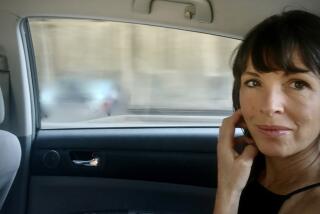Susan Choi is flirting with disaster--and love--in her new novel
Susan Choiâs fourth novel, âMy Education,â is a tricky book to categorize. On the one hand, itâs a campus novel, narrated by Regina Gottlieb, a graduate student in literature who falls under the sway of a charismatic professor and his wife at a university a lot like Cornell in the early 1990s. At the same time, this is just the background against which the larger story unfolds.
What Choi â a Guggenheim fellow whose 2004 novel âAmerican Womanâ was a Pulitzer finalist â is after is the elusive territory of experience, the way people and events imprint us when weâre young and then linger, exerting a subtle pressure over how we live our lives.
âWe are ghosts of ourselves, and of others,â Choi observes, âand all of those ghosts appear perfectly real.â
Regina represents this principle in action, a woman so young (emotionally, anyway) when we meet her that she is almost literally unformed. From the first line of the book, she is intrigued by a professor, Nicholas Brodeur, who has a reputation as a seducer, a role he seems to relish, appearing on campus in âa long duster coat, ⌠[h]is filthy blond hair stuck up and out in thatchy spikes from heavy use of some kind of pomade, as if it were 1982, not â92, and [wearing] Lennon shades with completely black lenses, as if it were outdoors, not in.â
Weâve all known professors like that (mine taught a class in fairy tales and liked to hang out with his students after hours), but if this offers a kind of double vision, itâs a perspective Regina does not share. Choi uses Reginaâs voice to show us things the character is not yet ready to understand, whether that has to do with Nicholasâ hipster affections or the more complex machinations of his wife, Martha, who also teaches at the university.
Martha is, in many ways, the catalyst of âMy Education,â a maddening yet compelling figure who swirls throughout these pages like a mistral wind. Itâs not giving much away to say that she and Regina end up in a relationship, nor that their tempestuous interplay fuels a good deal of the narrative.
This is the first, and most essential, of Choiâs plot turns, the way she sets us (and Regina) up to expect that Nicholas is the Lothario, when in fact it is the other way around. Or is it? As âMy Educationâ continues, this becomes an open question, with Regina pursuing Martha at the expense of her studies, her health, her best interests â at the expense of everything in her life.
âLove bestows such a dangerous sense of entitlement,â she declares, but Martha may have a more accurate sense of the situation when she complains that for Regina, love is often a manipulative strategy, that âit was always [your] trump card.â
Such a comment reflects a growing tension between the characters, driven, in large measure, by Reginaâs need. âGod,â Martha tells her. âYou are so youngâ â and if Regina takes this as an insult, itâs not far off the mark.
Regina is young, and more than that, sheâs callow, selfish, absorbed by her emotions, unable to empathize even with the woman she claims to adore. That may be Choiâs most vivid achievement, to get us to care about a character who, for much of the book, we find difficult, disruptive, a force of chaos.
Iâm not talking about likability, which remains, for me, beside the point. Still, thereâs no question that Regina can be infuriating, especially when sheâs turning a deaf ear to Marthaâs very real commitments: to her baby, to her husband, to her job.
The more she whines about not being loved well enough, the more we drift away from her, which is what Choi means for us to do. By putting us so deeply into Reginaâs head, she enables us to see what sheâs misreading, how her immaturity, her intractability contribute to her misery.
None of this is to suggest that Regina doesnât have real problems, not least her loverâs ambivalence. When, in the middle of the novel, Martha reneges on a promise to take her to a faculty reception â which we knew theyâd never attend â this becomes explicit: âIâm sorry, babe,â Martha says. âI couldnât do it. I couldnât walk into that party with you.â
And yet, even here, we empathize with both of them, for what else can Martha do? Iâm reminded of the scene in Woody Allenâs âHusbands and Wivesâ when Jack, played by Sydney Pollack, takes his much younger girlfriend to a party only to end up judged, embarrassed; âWhat was I thinking?â he laments.
That Regina canât understand this only makes the moment more powerful. This is why the book is called âMy Education,â not because so much of it takes place on a campus but because it illustrates the hard process of its narratorâs coming-of-age.
âMy true self felt so far from this conversation,â Regina observes while talking academics with another student, âthat, paradoxically, I homed in ever closer, fascinated, my true self trailing my physical self just offshore of, perhaps, my left shoulder.â
Itâs a stunning insight, a deft evocation of the unbridgeable gap between inner and outer life. As âMy Educationâ progresses, however, Choi loses sight of this, moving toward a resolution the novel doesnât need.
About three-quarters of the way through, she jumps ahead 15 years, catching up with Regina to show how she has learned the difficult lessons of adulthood. (âReader, I grew up,â she tells us in an echo of Jane Austen.)
âPeople talk about time like erosion: âgive it time, itâll turn to dust, itâll all go away,ââ Choi writes. Yet time, she adds, is more like â[l]acquer. ⌠Every year puts a new layer on and the past just gets harder and brighter and more permanent.â This suggests that we have no choice but to live with our regrets, our losses, to recognize that the past is not reclaimable, that there may be no way to make it right.
I agree with this entirely, that â[o]ne went from believing, when twenty, that it was the one kind of love that was real, to believing, once closer to forty, that it was not only fragile but false.â But in the end âMy Educationâ backs off from such a revelation, in favor of the more unlikely hope that our experience may be redeemable after all.
My Education
A Novel
Susan Choi
Viking: 296 pp., $26.95
More to Read
Sign up for our Book Club newsletter
Get the latest news, events and more from the Los Angeles Times Book Club, and help us get L.A. reading and talking.
You may occasionally receive promotional content from the Los Angeles Times.









